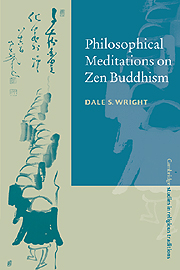Book contents
- Frontmatter
- Contents
- Introduction
- 1 TEXTUALITY: the “dependent origination” of Huang Po
- 2 READING: the practice of insight
- 3 UNDERSTANDING: the context of enlightenment
- 4 LANGUAGE: the sphere of immediacy
- 5 RHETORIC: the instrument of mediation
- 6 HISTORY: the genealogy of mind
- 7 FREEDOM: the practice of constraint
- 8 TRANSCENDENCE: “going beyond” Huang Po
- 9 MIND: the “Great Matter” of Zen
- 10 ENLIGHTENMENT: the awakening of mind
- CONCLUSION: Zen in theory and practice
- Bibliography
- Index
9 - MIND: the “Great Matter” of Zen
Published online by Cambridge University Press: 12 November 2009
- Frontmatter
- Contents
- Introduction
- 1 TEXTUALITY: the “dependent origination” of Huang Po
- 2 READING: the practice of insight
- 3 UNDERSTANDING: the context of enlightenment
- 4 LANGUAGE: the sphere of immediacy
- 5 RHETORIC: the instrument of mediation
- 6 HISTORY: the genealogy of mind
- 7 FREEDOM: the practice of constraint
- 8 TRANSCENDENCE: “going beyond” Huang Po
- 9 MIND: the “Great Matter” of Zen
- 10 ENLIGHTENMENT: the awakening of mind
- CONCLUSION: Zen in theory and practice
- Bibliography
- Index
Summary
It is equally deadly for a mind to have a system or to have none. Therefore it will have to decide to combine both.
Friedrich SchlegelQuestion: What is the Buddha? Answer: Mind is the Buddha and No Mind is the Way?
Huang PoOf all the symbols in the Huang Po texts, and all the issues of concern there, “mind” is clearly primary. Mind is the matter of the text – the “Great Matter” (ta-shih) to which all other concerns are subordinated. Therefore, in his Preface, P'ei-hsiu wrote that Huang Po “transmitted only ‘One Mind’ (I-hsin), aside from which, there is no other dharma.” Given the frequency of the topic, and the extent to which it encompasses all other concerns in the Huang Po literature, we can easily concur with P'ei-hsiu's observation. We can also see why some Zen editor rather early in the history of this text named the first collection of these Huang Po materials The Essential Teachings of Mind Transmission (Ch'uan-hsinfa-yao). If these are indeed the “essential teachings,” our meditations must focus here.
The text begins with the following lines: “The Master said to me [P'eihsiu]: All Buddhas and all sentient beings are only ‘One Mind.’ There is nothing else … Right before you, that's it!” If, as P'ei-hsiu's Preface claims, Huang Po's only teaching was the doctrine of the “One Mind,” we can now see why that is the case – “There is nothing else.” The “One Mind” “exceeds all boundaries” and therefore encompasses everything.
- Type
- Chapter
- Information
- Philosophical Meditations on Zen Buddhism , pp. 157 - 180Publisher: Cambridge University PressPrint publication year: 1998



